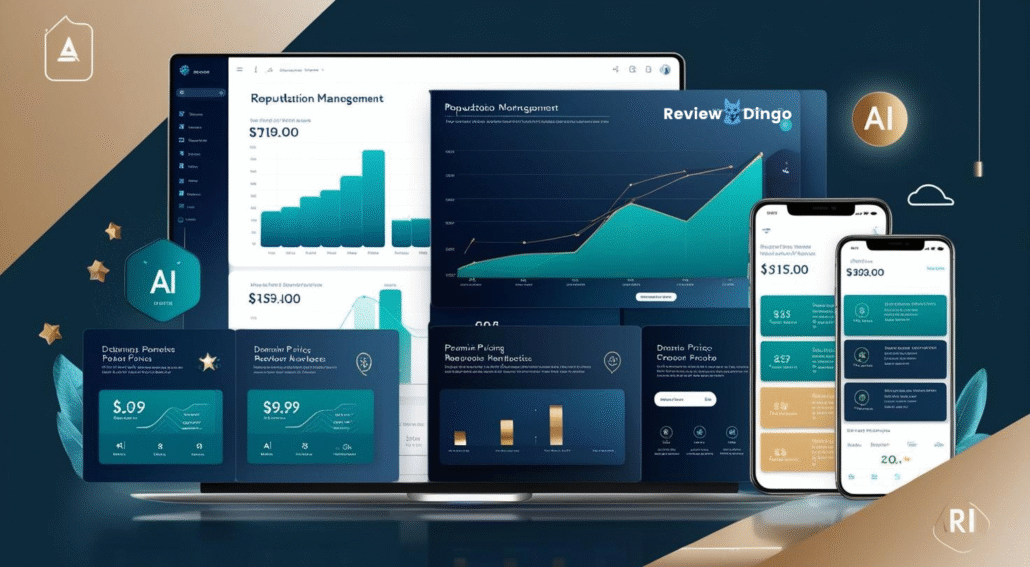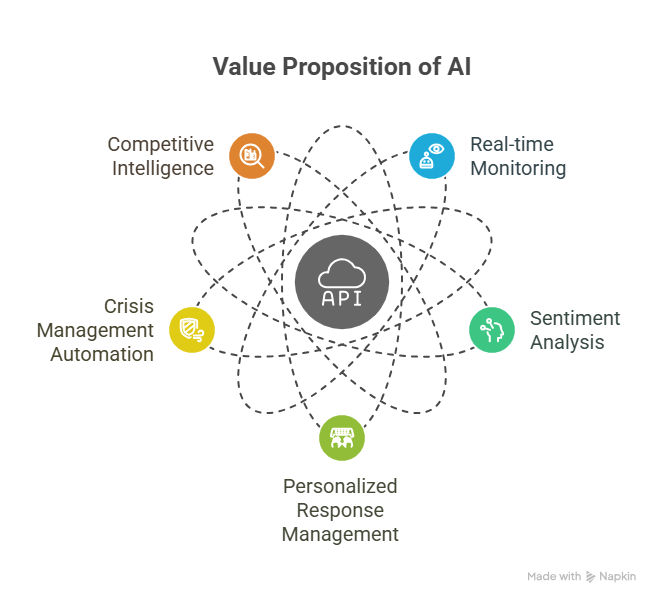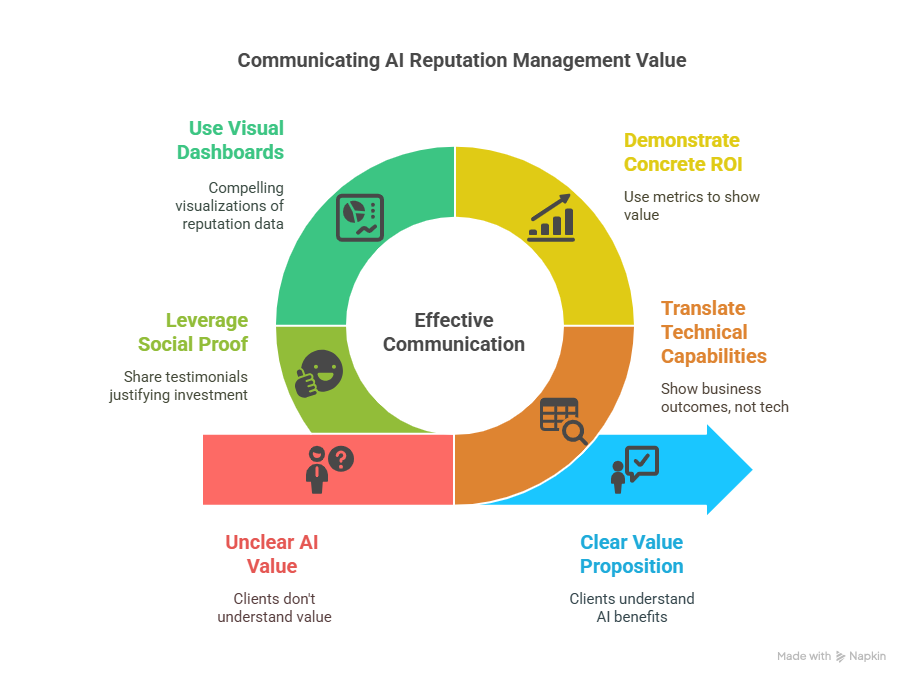
Last Updated on May 20, 2025 by Allen
How AI-Powered Reputation Management Is Revolutionizing Agency Pricing Strategies
Picture this: Your client’s brand is mentioned in a scathing Reddit thread at 2 AM. By breakfast, your AI system has already detected the threat, categorized its severity, formulated a response strategy, and prepared a draft reply—all while you were sleeping. How much is that peace of mind worth to your clients? This scenario illustrates why AI reputation management pricing strategies are undergoing a radical transformation in today’s digital landscape, where a company’s reputation can be made or destroyed with frightening speed.
In the high-stakes world of reputation management, artificial intelligence has become the ultimate game-changer, not just for how agencies protect client brands but for how they value and price these critical services. The days of one-size-fits-all monthly retainers are fading fast, replaced by sophisticated pricing models that reflect the true value of AI-powered vigilance in a world where reputation threats never sleep.
AI reputation management has fundamentally changed what agencies can deliver and, consequently, how they can price their services. – Allen Quay
“AI reputation management has fundamentally changed what agencies can deliver and, consequently, how they can price their services,” explains industry expert Allen Quay. “We’re no longer selling just time and expertise—we’re offering intelligent systems that can monitor, analyze, and respond to reputation threats in real-time.”
This shift toward AI-powered tools has created new opportunities for dynamic pricing strategies that better reflect the value delivered to clients. Today’s reputation management pricing models increasingly leverage AI capabilities to justify premium rates while delivering superior results and stronger ROI.
Understanding the Value Proposition of AI in Reputation Management
The value of AI in reputation management extends far beyond automation. AI systems excel at processing vast amounts of data, identifying patterns, and generating actionable insights that would be impossible for human teams to produce at scale. This technological advantage translates into tangible benefits that strengthen an agency’s pricing position.
Key AI capabilities that justify premium pricing include:
- Real-time monitoring across multiple channels: AI can continuously track mentions, reviews, and sentiment across the entire digital landscape.
- Sentiment analysis and trend prediction: AI tools help identify emerging reputation issues before they become crises.
- Personalized response management: AI can generate customized responses while maintaining brand voice consistency.
- Crisis management automation: AI systems can deploy pre-approved responses to mitigate damage during reputation threats.
- Competitive intelligence: AI can analyze competitor reputation strategies to identify opportunities and threats.
The Economics of AI-Powered Reputation Management
Implementing AI reputation management solutions requires a significant initial investment. Agencies must consider costs related to AI tool subscriptions, integration, customization, and ongoing management. However, the economies of scale dramatically favor AI-powered approaches as client portfolios grow.
“When we first integrated AI into our reputation management services, we saw our margins temporarily decrease,” shares Michael Roberts, founder of a digital marketing agency. “But within six months, we were able to handle three times the client load with the same team size. Our profit per client increased by over 40%.”
When we first integrated AI into our reputation management services, we saw our margins temporarily decrease. But within six months, we were able to handle three times the client load with the same team size. Our profit per client increased by over 40%. – Michael Roberts
This economic reality supports several pricing approaches:
- Higher base retainers: Justifying premium pricing based on superior technology and outcomes
- Value-based pricing components: Tying fees to measurable reputation improvements
- Scalable pricing tiers: Offering various levels of AI-enhanced services at different price points
AI helps agencies optimize pricing strategies by providing data on exactly what aspects of reputation management deliver the most value to specific client segments. This intelligence allows for more personalized pricing that maximizes both client satisfaction and agency profitability.
Strategic Pricing Models for Artificial Intelligence Reputation Management Services
The integration of AI into reputation management has spawned innovative pricing models that better align agency compensation with client outcomes. Let’s explore the most effective approaches:
Value-Based Pricing
This model ties agency fees directly to measurable reputation improvements. For example, an agency might charge a base fee plus performance bonuses for:
- Percentage increase in positive reviews
- Reduction in response time to negative feedback
- Improved sentiment scores across social platforms
- Higher placement in “best of” lists and rankings
Value-based pricing is particularly effective for demonstrating ROI, as clients can see the connection between their investment and tangible business results. AI makes this model viable by providing precise measurement of reputation metrics that would be difficult to track manually.
Tiered Service Packages
AI capabilities allow for natural service stratification, creating clear distinctions between package levels:
Basic Tier: Automated monitoring and alerts
Standard Tier: Monitoring plus AI-generated response recommendations
Premium Tier: Comprehensive AI-powered monitoring, response, and proactive reputation enhancement
Enterprise Tier: Custom AI solutions integrated with client systems and workflows
This approach allows clients to select the appropriate level of service while providing clear upgrade paths as their needs evolve. The visible differences in AI capabilities between tiers justify significant price differentials.
Dynamic Pricing Models
Some innovative agencies are implementing truly dynamic pricing that adjusts based on:
- Reputation risk factors within the client’s industry
- Volume of mentions and engagement
- Complexity of reputation challenges
- Seasonal factors affecting reputation exposure
AI systems can analyze these variables and recommend pricing adjustments that reflect the actual value delivered at different times. This approach maximizes revenue during high-demand periods while remaining competitive when reputation management needs are less intensive.
Case Studies: Successful AI Reputation Management Pricing Strategies
Case Study #1: Mid-Market Agency Transformation
A marketing agency with 25 employees implemented an AI-powered reputation management platform and restructured their pricing from hourly billing to a tiered subscription model. The results were remarkable:
- 35% increase in profit margins
- 28% reduction in client churn
- 42% growth in average client value
The key to their success was communicating how AI enhanced their service quality while demonstrating specific outcomes through detailed reporting dashboards. Clients could see precisely what they were getting for their investment.
Case Study #2: Boutique Agency Competing with Enterprise Solutions
A five-person agency specializing in reputation management for restaurants used AI to compete with much larger firms. By implementing personalized pricing strategies based on restaurant size, review volume, and competitive intensity, they:
- Secured clients with 40% higher budgets than their pre-AI average
- Achieved 92% client retention over 18 months
- Generated significant referral business based on measurable results
Their approach focused on the unique pricing challenges of the restaurant industry, using AI to develop highly customized reputation management plans that justified premium pricing.
Communicating the Benefits of AI Reputation Management to Clients
The most sophisticated AI reputation management system is worthless if clients don’t understand its value. Effective communication strategies include:
Translating technical capabilities into business outcomes: Instead of explaining how sentiment analysis works, show how it helps identify potential crises before they escalate.
Demonstrating ROI through concrete metrics: “Our AI system helped previous clients in your industry increase positive reviews by an average of 34% within six months.”
Using visual dashboards: AI makes it possible to create compelling visualizations of reputation data that help clients understand the value they’re receiving.
Leveraging social proof: Share testimonials specifically addressing how AI-powered services justified higher investment.
When communicating pricing, it’s crucial to focus on what the AI solution provides rather than how it works. Clients are investing in outcomes—improved reputation, protected brand value, increased customer trust—not in the technical details of artificial intelligence.
Future of AI Reputation Management Pricing
As AI technologies continue to evolve, several trends are emerging that will impact pricing strategies:
Generative AI and large language models are transforming response management, allowing for increasingly sophisticated, personalized interactions at scale. This capability will likely support higher pricing tiers for advanced AI-powered engagement.
Predictive reputation management is moving from reactive to truly proactive, identifying potential issues before they appear publicly. This shift from problem-solving to problem prevention represents a significant value enhancement that can justify premium pricing.
Integration with broader marketing technology stacks will create opportunities for bundled pricing approaches that connect reputation management with other digital marketing services.
As conversational AI and agentic AI systems become more sophisticated, we can expect to see entirely new service categories emerge, each with its pricing considerations. Agencies that stay ahead of these trends will be positioned to capitalize on AI advancements with innovative pricing models.
Implementing Your AI Reputation Management Pricing Strategy
Developing an effective pricing strategy for AI-powered reputation management involves several key steps:
- Assess your cost structure: Understand your investment in AI tools, necessary human resources, and ongoing operational expenses.
- Analyze competitor pricing: Research how other agencies price similar services, identifying gaps and opportunities.
- Segment your market: Different clients have different reputation needs and willingness to pay. Develop pricing tiers that address various segments.
- Define your value metrics: Determine exactly what outcomes you’ll measure to demonstrate value and potentially tie to performance-based pricing components.
- Develop clear communication materials: Create presentations, case studies, and proposals that effectively convey the value of your AI reputation management approach.
- Train your team: Ensure everyone can articulate the benefits of AI reputation management and justify your pricing structure.
- Test and refine: Implement A/B testing of different pricing approaches to determine what resonates best with your target market.
Conclusion: Capitalizing on AI to Transform Your Reputation Management Business
AI is fundamentally changing reputation management—from how services are delivered to how they’re valued and priced. Agencies that successfully leverage AI technologies can justify premium pricing while delivering superior results, creating a virtuous cycle of value creation.
The most successful pricing strategies will balance multiple approaches: value-based components that align agency compensation with client outcomes, tiered offerings that provide clear choices, and potentially dynamic elements that reflect the varying intensity of reputation management needs.
As we look to the future of reputation management, one thing is clear: AI will continue to enhance what’s possible, and pricing models will evolve accordingly.
Agencies that embrace this transformation—developing pricing strategies that reflect the true value of AI-powered reputation management—will thrive in this new landscape.
The question isn’t whether to integrate AI into your reputation management services and pricing strategy, but how to do so most effectively.
By understanding the unique capabilities of AI, applying proven persuasion principles, and clearly communicating value, agencies can develop pricing models that support sustainable growth while delivering exceptional client outcomes.
In reputation management, as in many other fields, AI isn’t just a tool—it’s a fundamental shift in what’s possible. Your pricing strategy should reflect that reality.






